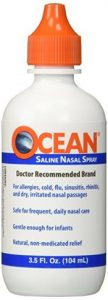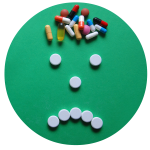Hey mamas! We caught up with one of the newest Mercy physicians, Dr. Patrick Greenburg, to find out what illnesses he is seeing in the Mercy clinic these days and what we can do to help ourselves and our kids NOT catch it (and what to do if they do catch it.)
He also gave us some pointers on when to take a kid to the doctor versus waiting it out, what to do about the stomach flu, and how to tell the difference between a sinus infection that needs treatment and one that will resolve in time.
What are some of the contagious illnesses you’re seeing a lot of in the clinic right now?
 Fall is usually when we start seeing a lot more upper respiratory infections rolling in, which means a lot of coughs, sore throats, and sinus infections. We’re getting closer to flu season and will probably start seeing more cases of flu soon. Otherwise, we’ve been seeing a lot of allergies and asthma flare-ups, as these are made worse by the change in seasons.
Fall is usually when we start seeing a lot more upper respiratory infections rolling in, which means a lot of coughs, sore throats, and sinus infections. We’re getting closer to flu season and will probably start seeing more cases of flu soon. Otherwise, we’ve been seeing a lot of allergies and asthma flare-ups, as these are made worse by the change in seasons.
It’s often hard for moms to know when to take a sick kid to the clinic and when to “wait it out,” in case it’s a cold virus. What guidelines would you give moms who are trying to determine when to make an appointment?
Most kids that get sick will have a viral illness, and most viral illnesses don’t have or need a treatment other than time. There are a few that should be seen by a provider for treatment, however.
If your child has a severe sore throat and fever without a cough, there’s a good chance they have strep throat. This should be seen in the clinic and treated with antibiotics. Untreated strep throat infections can lead to further infections that may damage valves of the heart.
If your child has high fevers, muscle aches, nausea and vomiting, he or she may have the flu and should probably be seen in the clinic. This is one of the few cases where the infection is viral, but we do have a treatment for it (Tamiflu). The medication is only of benefit in the first few days of the infection. The mainstay of treatment is making sure the child stays well-hydrated.
Otherwise, most illnesses are safe to keep an eye on at home, with these caveats:
 In any infant less than 3 months old, all fevers should be considered serious and seen by a provider.
In any infant less than 3 months old, all fevers should be considered serious and seen by a provider.- Any child with persistent HIGH fevers should be seen.
- Any child that is unable to eat or drink and is becoming dehydrated should be seen.
- Any child that is lethargic or difficult to arouse should be seen.
- Any child that is having breathing difficulties should be seen.
If none of these are occurring, it’s usually okay to keep an eye on them at home. Try to keep them well-hydrated. Low-grade fevers are normal and can be managed with acetaminophen, ibuprofen, and cool soaks or baths.
When the dreaded “stomach virus” begins circulating around schools, what advice would you give to parents whose kids come down with it? What are the early signs of dehydration that would require a trip to the doctor’s office or Emergency room?
 Hand washing, hand washing, and more hand washing. The viruses that cause these illnesses are very contagious, and simply touching a surface that someone else has touched can be enough to cause an infection if ingested. Routine washing of hands with soap and water (alcohol-based sanitizers do not kill some of the viruses), especially before meals, is the most important way to prevent this.
Hand washing, hand washing, and more hand washing. The viruses that cause these illnesses are very contagious, and simply touching a surface that someone else has touched can be enough to cause an infection if ingested. Routine washing of hands with soap and water (alcohol-based sanitizers do not kill some of the viruses), especially before meals, is the most important way to prevent this.
The mainstay of treatment is good hydration. Dehydration is the most serious complication as kids are losing fluids through vomiting, diarrhea, and a lack of appetite. If a child cannot take or keep down any fluids, he or she needs to be seen. If the child is tolerating fluids, small amounts of mild foods can be tried (carbs, lean meats, yogurt, fruits, vegetables).
Signs of dehydration that should prompt a trip to the office or ER: Decreased/no urine output, cool or blueish appearing skin, sunken eyes, dried lips, lack of tear production, or an increased rate of breathing.
It can be tough to make a kid with severe congestion comfortable. What kinds of things would you advise parents to do to decrease congestion? At what point should parents be concerned that severe congestion has turned into a sinus infection?
To help with congestion, try these steps:
In infants, regular use of nasal suction followed by saline nasal drops and a nasal decongestant can help.
 In children, adequate hydration, use of nasal saline sprays, humidified air from a humidifier or vaporizer, and Tylenol/ibuprofen as needed for discomfort.
In children, adequate hydration, use of nasal saline sprays, humidified air from a humidifier or vaporizer, and Tylenol/ibuprofen as needed for discomfort.
There are some prescription nasal sprays that can help with short-term congestion, but this is usually for persistent cases.
For children over 12 years old, over-the-counter decongestants can be used. Oral decongestants (pseudoephedrine and phenylephine) can be used for longer than 3 days and have side effects of fast heart rate and high blood pressures. Nasal decongestants should only be used for 3 days or less to avoid rebound congestion.
Most sinus infections are viral illnesses. Sinuses are hollow spots in our skull. When we are sick, they tend to fill with mucus. This can cause an aching pain behind the forehead or cheekbones. In addition, nasal discharge, headache, and decreased sense of smell are common symptoms. Most sinus infections ARE NOT bacterial and do not require antibiotics. Symptoms that may suggest a bacterial infection are sinus infections lasting over 1 week, sinuses that are painful to touch, or high fevers. These should prompt a visit to a doctor’s office.
Our thanks to Dr. Patrick Greenburg of Mercy for sharing his expertise and guidance on some of the illnesses we’ll all be seeing more of during cold and flu season. To schedule an appointment with Dr. Greenburg, call the Bentonville clinic at 479-435-7103 or click here to see more information about him.






